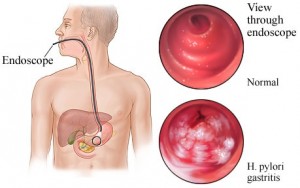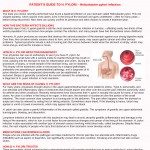H. PYLORI – Helicobacter pylori infection
PATIENT’S GUIDE TO H. PYLORI – Helicobacter pylori infection
WHAT IS H. PYLORI?
The tests your doctor recently performed have found a bacterial infection in your stomach called Helicobacter pylori. This rod shaped bacteria, which causes most ulcers, lives in the lining of the stomach and goes undetected – often for many years – before being discovered. New tests can quickly confirm its presence and allow doctors to create a treatment plan.
HOW THIS BACTERIA AFFECTS BILLIONS
Scientists report that H. pylori gastritis is still the most common chronic infection in humans – affecting nearly two-thirds of the world’s population! It is not known how people contract this infection, and many people have had the bacteria since childhood. However, H. pylori produces an enzyme that destroys the natural protection of the stomach against your strong digestive acids.
Over time, this corrosive activity causes ulcers to form, and in some cases, may cause gastric cancer and other serious problems. Typical symptoms include a dull or burning pain that occurs between meals when the stomach is empty, which may come and go, and last for minutes or hours.
HOW IS H. PYLORI INFECTION DIAGNOSED?
Your physician can use an endoscopy to see if you have H. pylori. An Endoscopy is small tube with a camera inside is inserted through the mouth or nose, passing into the stomach to look for inflammation and ulcers. During the procedure, a biopsy, or small sample of the stomach lining, can be obtained. This biopsy will be examined under a microscope by a surgical pathologist,
preferably one specializing in gastrointestinal pathology, and a diagnosis of H. pylori infection or other unexpected abnormality can be established or excluded. Biopsy is generally considered the current standard for establishing a diagnosis of H. pylori infection in most scenarios.
WHAT ARE THE RISKS OF HAVING H. PYLORI?
For many years, physicians thought ulcers in the upper gastrointestinal tract were related to stress, ‘Type A’ personality, and non-steroidal anti-inflammatory class of medicines that include aspirin and other over-the-counter pain relievers commonly used for arthritis and other conditions. Recently researchers have discovered that H. pylori is actually the cause for many, if not most
ulcers. An ulcer is a defect in the lining of an organ, in this case, the stomach or duodenum (the first portion of the small intestine). The most common ulcer symptom is a burning pain in the abdomen. The pain often happens when the stomach is empty and may be relieved by eating food or taking antacids. Sometimes ulcers bleed. If the bleeding is heavy, blood may
appear in vomit or bowel movements, which may appear dark red or black. H. pylori can also cause a painful inflammation of the stomach called gastritis. The symptoms of gastritis are upper-abdominal burning/pain, bloating, and discomfort. Long-term infection of the stomach with this bacterium may lead to chronic atrophic gastritis (inflammation and damage to the
lining of the stomach), which in turn is a risk factor for pre-cancerous changes and cancer of the lining of the stomach. H. pylori infection is also associated with another type of stomach cancer involving white blood cells, called lymphoma. Despite these risks, the vast majority of people who carry this bacterium in their stomachs never develop cancer.
MEDICATIONS CAN WORSEN ULCERS
People who are infected with this pathogen and take medicine for chronic pain like non-steroidal anti- inflammatory drugs (NSAIDS) such as aspirin or ibuprofen, can significantly worsen their ulcer condition. Smoking and alcohol can also worsen ulcers.
HOW IS H. PYLORI TREATED
There are multiple clinical scenarios that a gastroenterologist will consider regarding how to treat a particular H. pylori infection, however, treatment typically involves multiple medications taken together. Most treatment regimens include a proton pump inhibitor and multiple (usually two) antibiotics. It is important to take all of the medications for the fully prescribed manner to
protect against antibiotic resistance.
Click on image below to download your own printable copy of this handout



